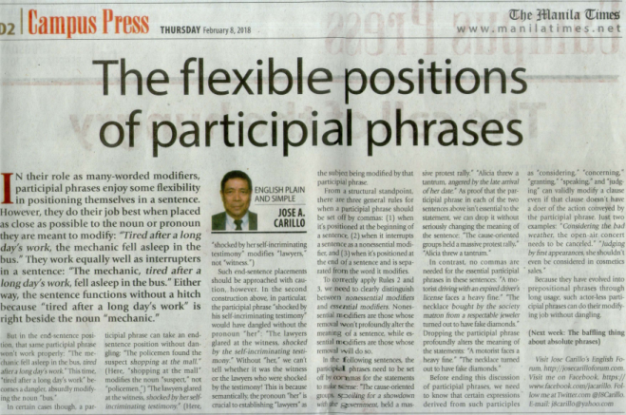In their role as many-worded modifiers, participial phrases enjoy some flexibility in positioning themselves in a sentence. However, they do their job best when placed as close as possible to the noun or pronoun they are meant to modify: “
Tired after a long day’s work, the mechanic fell asleep in the bus.” They work equally well as interrupters in a sentence: “The mechanic,
tired after a long day’s work, fell asleep in the bus.” Either way, the sentence functions without a hitch because “tired after a long day’s work” is right beside the noun “mechanic.”
But in the end-sentence position, that same participial phrase won’t work properly: “The mechanic fell asleep in the bus,
tired after a long day’s work.” This time, “tired after a long day’s work” becomes a dangler, absurdly modifying the noun “bus.”
In certain cases though, a participial phrase can take an end-sentence position without dangling: “The policemen found the suspect
shopping at the mall.” (Here, “shopping at the mall” modifies the noun “suspect,” not “policemen.”) “The lawyers glared at the witness,
shocked by her self-incriminating testimony.” (Here, “shocked by her self-incriminating testimony” modifies “lawyers,” not “witness.”)
Such end-sentence placements should be approached with caution, however. In the second construction above, in particular, the participial phrase “shocked by his self-incriminating testimony” would have dangled without the pronoun “her”: “The lawyers glared at the witness,
shocked by the self-incriminating testimony.” Without “her,” we can’t tell whether it was the witness or the lawyers who were shocked by the testimony! This is because semantically, the pronoun “her” is crucial to establishing “lawyers” as the subject being modified by that participial phrase.
From a structural standpoint, there are three general rules for when a participial phrase should be set off by commas: (1) when it’s positioned at the beginning of a sentence, (2) when it interrupts a sentence as a nonessential modifier, and (3) when it’s positioned at the end of a sentence and is separated from the word it modifies.
PARTICIPIAL PHRASE AS FRONT-END MODIFIER IN A SENTENCE
To correctly apply Rules 2 and 3, we need to clearly distinguish between nonessential modifiers and essential modifiers.
Nonessential modifiers are those whose removal won’t profoundly alter the meaning of a sentence, while
essential modifiers are those whose removal will do so.
In the following sentences, the participial phrases need to be set off by commas for the statements to make sense: “The cause-oriented groups,
spoiling for a showdown with the government, held a massive protest rally.” “Alicia threw a tantrum,
angered by the late arrival of her date.” As proof that the participial phrase in each of the two sentences above isn’t essential to the statement, we can drop it without seriously changing the meaning of the sentence: “The cause-oriented groups held a massive protest rally.” “Alicia threw a tantrum.”
In contrast, no commas are needed for the essential participial phrases in these sentences: “A motorist
driving with an expired driver’s license faces a heavy fine.” “The necklace
bought by the society matron from a respectable jeweler turned out to have fake diamonds.” Dropping the participial phrase profoundly alters the meaning of the statements: “A motorist faces a heavy fine.” “The necklace turned out to have fake diamonds.”
Before ending this discussion of participial phrases, we need to know that certain expressions derived from such participles as “considering,” “concerning,” “granting,” “speaking,” and “judging” can validly modify a clause even if that clause doesn’t have a doer of the action conveyed by the participial phrase. Just two examples: “
Considering the bad weather, the open-air concert needs to be canceled.” “
Judging by first appearances, she shouldn’t even be considered in cosmetics sales.”
Because they have evolved into prepositional phrases through long usage, such actor-less participial phrases can do their modifying job without dangling.
We are done with our discussion of participial phrases in their role as flexible many-worded modifiers.
 This essay, 1078th in the series, appeared in the column “English Plain and Simple” by Jose A. Carillo in the Campus Press section of the February 8, 2018 issue (print edition only) of
This essay, 1078th in the series, appeared in the column “English Plain and Simple” by Jose A. Carillo in the Campus Press section of the February 8, 2018 issue (print edition only) of The Manila Times
, © 2018 by the Manila Times Publishing Corp. All rights reserved.(Next:
The baffling thing about absolute phrases) February 15, 2018